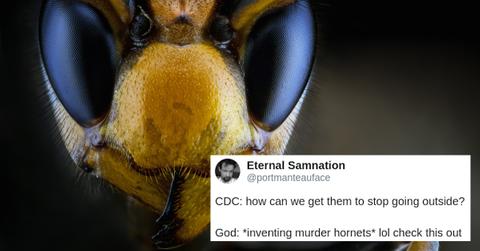First There Was COVID-19, and Now Swarms of Murder Hornets — Thanks, 2020
Updated May 3 2020, 1:35 p.m. ET

For most of the globe recently, life's been a rollercoaster of weirdness, uncertainty, financial ruin, and plague. No, it's not the end of the world (well, some people sure act like it is,) it's just the year 2020.
Once we entered into the new decade, mother nature said, "You know what, let's screw with humanity just for the heck of it." And just when you thought couldn't get any worse with the novel coronavirus pandemic, 2020's got a new surprise: the Asian giant "murder" hornet.
Vespa mandarinia is a ferocious insect that typically isn't found in North America, but has been spotted in Washington state for the first time ever in the last few months. The state department of agriculture said that they first got a whiff of these winged devils in December 2019, but they typically become most active in the spring.
You know that these things are creepy when a bee breeder gives them the following description:
"They're like something out of a monster cartoon with this huge yellow-orange face," said Susan Cobey at Washington State University's department of entomology.
Todd Murray, who's an invasive species specialist has called it a "shockingly large hornet," and although these "monsters" aren't naturally aggressive towards human beings and pets, there have been instances where folks have been killed by the gnarly little buggers.
The human fatality numbers aren't staggering, but to give you an idea of how bad they are, in a single quarter in 2013, the hornets killed 41 people in the Shaanxi province, China, and injured 1,600.
Bee sting deaths in general have risen over the last few years, according to the U.S. Centers for Disease Control and Prevention (CDC.) In 2001, 43 people died from bee, hornet, and wasp stings. In 2017? That number was 89.
But these Asian giant "murder" hornets don't get their name for the damage they incur on people — mostly it's honeybees. For some reason, these mean hornets have a bonafide obsession with raiding honeybee hives, wrecking their domiciles, and decapitating every single bee in sight.
It's brutal and almost kinda vindictive, and definitely something straight out of a Bee Movie sequel where they have to go up against a throng of nasty hornets.
The Washington State Department of Agriculture has said, "Asian giant hornet attacks and destroys honeybee hives. A few hornets can destroy a hive in a matter of hours. The hornets enter a 'slaughter phase' where they kill bees by decapitating them. They then defend the hive as their own, taking the brood to feed their own young. They also attack other insects but are not known to destroy entire populations of those insects."
If that doesn't sound like something straight out of a Gore Metal lyrics book, then I don't know what is. These hornets are basically Viking invaders that cut the heads off of adults and then feed the murdered parents to their own babies.
Even though their ire seems to be directly aimed at honeybees, the WSDA is taking sightings of these hornets very seriously.
They've posted a web page with bright red warning signs urging people to stay away from them, along with tons of information on where sightings of the insects were reported and with techniques on how to trap them.
Chris Looney, an entomologist writes in a blog post on the site: "Don't try to take them out yourself if you see them. If you get into them, run away, then call us! It is really important for us to know of every sighting, if we're going to have any hope of eradication."
Although the threat isn't as severe and won't affect nearly as many people as the COVID-19 pandemic, there are still a bunch of folks who are throwing their arms up in the air at 2020 as they've given up hope of ever having a normal year.
Of course, there are also tons of people making hilarious memes about the "murder hornets" that are freaking everyone out right about now.
If you do happen to come across an Asian giant "murder" hornet, get away ASAP — and then be sure report them to your local agricultural department so they can investigate.